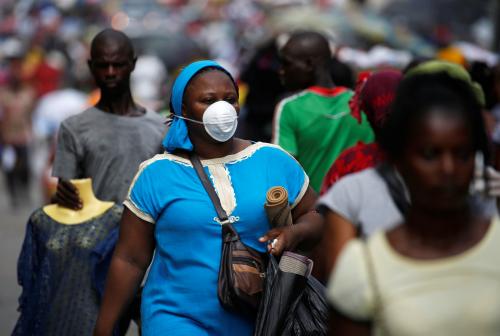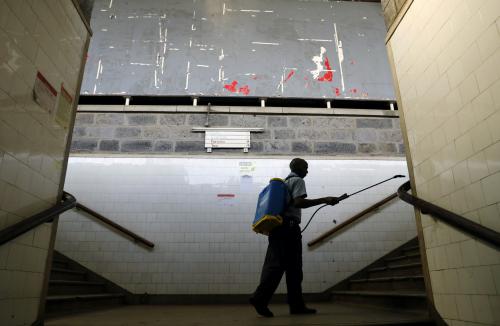Uganda and the European Union strengthen trade and business relationship
Earlier this month, Uganda hosted a delegation from the European Union (EU) for the first-ever Uganda-Europe Business Forum. The forum is a part of a larger effort to “facilitate collaboration between private and public actors and partnership between Ugandan and European companies, in the framework of the Sustainable Business for Uganda Platform.” The EU is an important trade and investment partner for the East African country: Trade between Uganda and the EU was worth $1.1 billion in 2018.
As a follow-up to the forum, Uganda signed three grant financing agreements with the EU, worth $97.5 million. The agreements are intended to support projects aimed at improving the standards of Ugandan products, thus assisting the country in qualifying for and sustaining its exports to Europe. More specifically, according to Ugandan Finance Minister Matia Kasaija, about $50 million will go towards funding the inclusive green economy uptake program, which involves developing products and projects that reduce environmental risks. According to EU Ambassador Attilio Pacifici, those projects include “climate-smart agriculture, green cities, eco-tourism, scaling of renewable energy investments that target off-grid and reduction of waste projects, as well as liquefied petroleum gas (LPG) for households and industry.” Already, EU companies finance a number of infrastructure development and improvement projects in Uganda. Long term, according to Pacifici, EU firms plan to invest $733.3 million in the country over the next five years.
Malawi’s Mutharika rejects election reforms; Cote d’Ivoire’s Ouattara won’t seek a third term
Earlier this week, President of Malawi Peter Mutharika announced he was refusing to ratify recent changes to his country’s electoral laws approved by the country’s parliament, arguing that the proposed laws controvert Malawi’s constitution. Malawi’s parliament recently set a date of May 19 for the new presidential election as well as amending the Electoral Act to allow for a runoff election within 30 days if no candidate wins an outright majority of votes. The results of the 2019 election, which Mutharika claims he won, were annulled earlier this year by the country’s Constitutional Court under the claims of “widespread, systematic and grave” irregularities. Mutharika continues to appeal the court’s ruling.
On March 13, Mutharika had also dissolved his cabinet, consolidating all “all ministerial powers, functions and responsibilities” to the office of the president. Mutharika appointed a new cabinet this week. Also this week, Mutharika sacked Army Commander Vincent Nundwe who had gained fame last year in his peaceful handling of local protests over the 2019 election.
In other political news, President Alassane Ouattara of Côte d’Ivoire announced on March 5 that he would not be standing for reelection come the fall. Tensions in the country had been mounting since Ouattara’s controversial 2019 statement that the 2016 constitution allowed him to run for a third term. In his announcement, Ouattara emphasized that the transfer of power should go to a younger generation.
African airlines challenged by plummeting demand
Last week, Africa’s Airline Association (AFRAA) warned that “significant” losses are on the horizon for Africa’s already-struggling airlines. Africa’s aviation industry has recorded losses annually since 2010, losing on average $1.09 per passenger due to limited demand and a small intercontinental market share. Now, as many countries close their borders to nonresidents and demand for flights decreases due to the COVID-19 pandemic, multiple flights have been canceled or temporarily suspended across the continent. According to a report from the International Air Transport Association, as of March 11, this decrease in demand has led African airlines to record a loss of up to $4.4 billion in revenue since the virus began to spread.
Among the airlines most affected is South African Airways, which has received more than $1.2 billion in bailouts over the last three years, and which announced on Friday that it would be suspending all intercontinental flights until May 31. Other affected airlines include Rwanda Air and Air Mauritius, which suspended all flights to China, normally a major source of demand; Kenya Airways, which suspended flights to countries affected by the virus; and Morocco’s Royal Air-Maroc, which is facing the suspension of all international flights to and from the country. AFRAA has urged African governments to consider compensating airlines for losses and subsidizing airlines in order to ensure the industry’s survival through the pandemic.
COVID-19 update
COVID-19 cases have now been confirmed in at least 30 of Africa’s 54 countries, and countries have begun taking a range of measures to slow the spread of the virus. The Brookings Africa Growth Initiative (AGI) team is continuing to monitor the spread of the virus across the continent as well as its socioeconomic impacts. For recent AGI analysis, see Strategies for coping with the health and economic effects of the COVID-19 pandemic in Africa by Brahima Coulibaly and Payce Madden, and Coronavirus: Amid the global pandemic, lessons for Africa by Yvonne Mburu and Yap Boum II, among other forthcoming pieces.





Commentary
Africa in the news: The Uganda-EU deal, politics, airlines, and COVID-19 updates
March 21, 2020